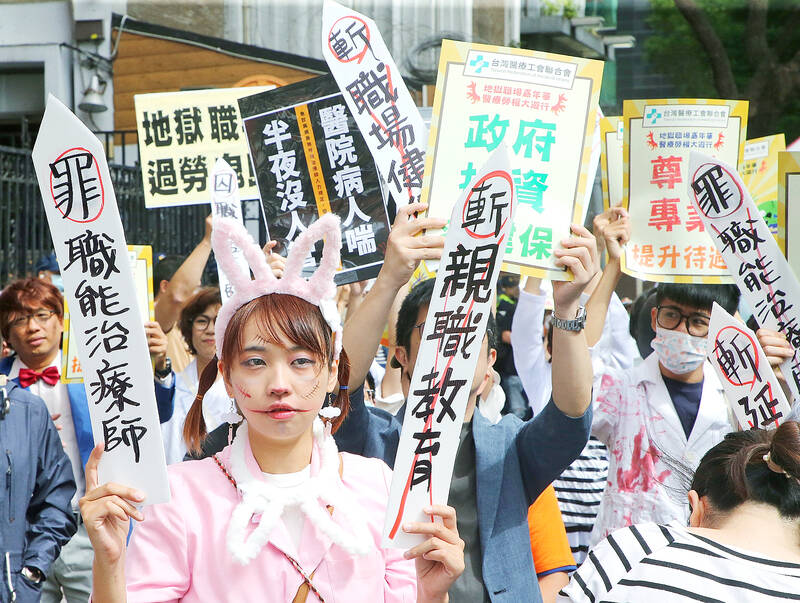The Taiwan Federation of Medical Unions (TFMU) yesterday held a rally in front of the Legislative Yuan and a short parade, urging the government to improve healthcare workers’ labor conditions by accepting its four main demands.
At about 1pm yesterday, a few hundred people, including some dressed in Halloween costumes, started gathering in front of a mobile stage set up in front of the Legislative Yuan in Taipei.
With slogans such as “Labor shortage makes us overworked ghosts,” “Working two or three types of shifts in a week turns us into zombies” and “Forced to do illegal practices makes us feel like phantoms,” the TFMU said that since Halloween is around the corner, it invited participants to dress up when attending the rally.

Photo: CNA
Several healthcare workers were seen wearing white coats with red paint spattered all over, to symbolize the “blood, sweat and tears” of healthcare workers who have to work in poor labor conditions and that the healthcare working environment is “hell.”
TFMU head Chao Lin-yu (趙麟宇) said the rally’s four demands for the government are to “replenish healthcare manpower,” “improve healthcare workers’ safety at work,” “allocate more of the National Health Insurance (NHI) budget to save the NHI system,” and to “let healthcare professionals receive the respect they deserve.”
Nurse representative Lo Yun-sheng (羅運生) said many nurses have left the workforce because they were overworked, as hospitals asked them to work 12 hours a day or to work two or three types of shifts in a week.
Nurses want a three-shift system to become law within two years to prevent nurses from being overworked, she said.
The TFMU said as there are also cases of physicians suddenly being asked to leave, that physicians’ labor rights should be protected by the Labor Standards Act (勞動基準法).
As some healthcare professionals are not allowed to perform certain practices, such as occupational therapists not being allowed to conduct “health promotion” without a physician’s prescription, legal amendments should be made to show respect for healthcare professionals, as well as salary increases, the TMFU said.
Separately, on the eve of the rally and parade on Saturday, the Ministry of Health and Welfare held a news conference that evening to explain the consensus it had reached in a meeting with 21 healthcare workers’ trade associations that afternoon.
Minister of Health and Welfare Hsueh Jui-yuan (薛瑞元) said 29 representatives from the associations, including physicians, nurses and pharmacists, attended the 2.5 hour meeting, and the ministry listened to their difficulties and suggestions.
On the issue of staff shortage, he said that some relatively newer licensed professions, such as dental technicians, optometrists and audiologists that cannot meet increasing demand, so comprehensive reviews would be conducted to make the worker-patient ratio and working conditions more reasonable.
Responding to the claim that Taiwan’s national health expenditure (NHE) is only about 6 percent of the nation’s GDP, lower than several countries, Hsueh said that Organisation for Economic Co-operation and Development countries include long-term care expenditure in their NHE, but it was not added to Taiwan’s NHE as of last year, so the gap is not that great.
The ministry also promised to periodically invite the associations to discuss better responding to their needs, he added.
Deputy Minister Victor Wang (王必勝) said the ministry hopes to hold at least two to three meetings per year, and that Saturday’s meeting was with medical associations, but since the rally was held by labor unions, the ministry is still negotiating with them when to meet to discuss issues this coming week.

Taiwan is stepping up plans to create self-sufficient supply chains for combat drones and increase foreign orders from the US to counter China’s numerical superiority, a defense official said on Saturday. Commenting on condition of anonymity, the official said the nation’s armed forces are in agreement with US Admiral Samuel Paparo’s assessment that Taiwan’s military must be prepared to turn the nation’s waters into a “hellscape” for the Chinese People’s Liberation Army (PLA). Paparo, the commander of the US Indo-Pacific Command, reiterated the concept during a Congressional hearing in Washington on Wednesday. He first coined the term in a security conference last

Prosecutors today declined to say who was questioned regarding alleged forgery on petitions to recall Democratic Progressive Party (DPP) legislators, after Chinese-language media earlier reported that members of the Chinese Nationalist Party (KMT) Youth League were brought in for questioning. The Ministry of Justice Investigation Bureau confirmed that two people had been questioned, but did not disclose any further information about the ongoing investigation. KMT Youth League members Lee Hsiao-liang (李孝亮) and Liu Szu-yin (劉思吟) — who are leading the effort to recall DPP caucus chief executive Rosalia Wu (吳思瑤) and Legislator Wu Pei-yi (吳沛憶) — both posted on Facebook saying: “I

The Ministry of Economic Affairs has fined Taobao NT$1.2 million (US$36,912) for advertisements that exceed its approved business scope, requiring the Chinese e-commerce platform to make corrections in the first half of this year or its license may be revoked. Lawmakers have called for stricter enforcement of Chinese e-commerce platforms and measures to prevent China from laundering its goods through Taiwan in response to US President Donald Trump’s heavy tariffs on China. The Legislative Yuan’s Finance Committee met today to discuss policies to prevent China from dumping goods in Taiwan, inviting government agencies to report. Democratic Progressive Party Legislator Kuo Kuo-wen (郭國文) said

Sung Chien-liang (宋建樑), who led efforts to recall Democratic Progressive Party (DPP) Legislator Lee Kun-cheng (李坤城), was released on bail of NT$80,000 today amid outcry over his decision to wear a Nazi armband to questioning the night before. Sung arrived at the New Taipei District Prosecutors’ Office for questioning in a recall petition forgery case last night wearing a red armband bearing a swastika, carrying a copy of Adolf Hitler’s Mein Kampf and giving a Nazi salute. Sung left the building at 1:15am without the armband and covering the book with his coat. Lee said today that this is a serious